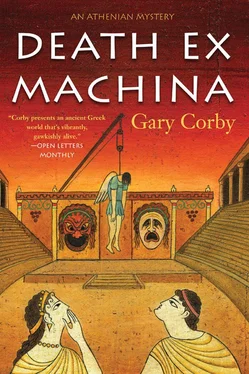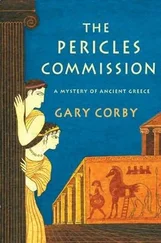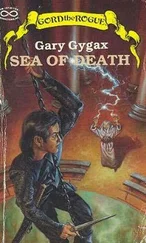Gary Corby - Death Ex Machina
Здесь есть возможность читать онлайн «Gary Corby - Death Ex Machina» весь текст электронной книги совершенно бесплатно (целиком полную версию без сокращений). В некоторых случаях можно слушать аудио, скачать через торрент в формате fb2 и присутствует краткое содержание. Год выпуска: 2015, ISBN: 2015, Издательство: Soho Press, Жанр: Исторический детектив, на английском языке. Описание произведения, (предисловие) а так же отзывы посетителей доступны на портале библиотеки ЛибКат.
- Название:Death Ex Machina
- Автор:
- Издательство:Soho Press
- Жанр:
- Год:2015
- ISBN:978-1-61695-520-5
- Рейтинг книги:3 / 5. Голосов: 1
-
Избранное:Добавить в избранное
- Отзывы:
-
Ваша оценка:
- 60
- 1
- 2
- 3
- 4
- 5
Death Ex Machina: краткое содержание, описание и аннотация
Предлагаем к чтению аннотацию, описание, краткое содержание или предисловие (зависит от того, что написал сам автор книги «Death Ex Machina»). Если вы не нашли необходимую информацию о книге — напишите в комментариях, мы постараемся отыскать её.
Death Ex Machina — читать онлайн бесплатно полную книгу (весь текст) целиком
Ниже представлен текст книги, разбитый по страницам. Система сохранения места последней прочитанной страницы, позволяет с удобством читать онлайн бесплатно книгу «Death Ex Machina», без необходимости каждый раз заново искать на чём Вы остановились. Поставьте закладку, и сможете в любой момент перейти на страницу, на которой закончили чтение.
Интервал:
Закладка:
I pointed him out to Diotima and Pythax.
“Is there something wrong with him?” she asked.
“I don’t think he’s a member of the crew,” I said. “I didn’t see him speak to anyone else.”
“It’s a public theater,” Diotima said. “Maybe he’s interested.”
“Maybe. But you and I know we have to be on the look out for a saboteur.”
Diotima gave the back of the departing stranger another look. “We could chase him down?” she said.
Pythax snorted. “No you can’t. He’s a citizen, it’s a free city, and he ain’t committed a crime.”
Those words from the city’s senior law enforcer ended the question.
“Well, nothing can go wrong at today’s rehearsal,” Diotima said “We didn’t announce the ritual until the last moment, a hundred people have been watching the stage, there hasn’t been time for the saboteur to do any damage since, and the rehearsal is about to start.”
Indeed it was. Men were already on the stage, preparing. Backstage, someone was shouting at the chorus to get in line.
In the time I had, I took a quick look at the God’s statue. I had never before seen our city’s statue of Dionysos up close. Our Dionysos was wooden, and very old. The God was sculpted in the stiff style of past generations. There were cracks where the wood had dried and shrunk. Those had been artfully hidden under recent paint. The eyes in particular looked very realistic. They were the eyes of a god who saw everything.
One thing the God saw, standing as he was at the far edge of the stage, was something that hadn’t been there yesterday. Someone had painted words onto the rear wall, out of view of the audience but fully visible to everyone backstage. They were in large, unmissable letters of commanding red paint, and they said:
NO WHISTLING!
I entered the chaos of the preparations backstage to ask what it was for.
“I just put it up,” said Akamas.
“Why?” I asked.
“You expelled the ghost, right?” he said.
“Right,” I agreed. That, after all, was what Pericles had hired me to do; to convince everyone that the ghost had been sent away.
“Well, we don’t want the ghost to come back, do we?” Akamas said.
I thought about trying to explain that there was no ghost, realized that was futile, and instead said, “No, of course not.”
Akamas said knowingly, “Well then, there was whistling when I saw the ghost. So if no one whistles, it won’t tempt the ghost to return, or bring back the bad luck with it. That’s logic, right?”
It wasn’t any logic that I recognized. But I could sense that all around me, the crew and actors were listening in on this conversation, waiting to see how I would react. If I told them to remove the sign, they might think the ghost could return.
It occurred to me that the signed command couldn’t do any harm, and if it made the actors and crew feel more comfortable and safer in the theater then it was all to the good. So I said, “Excellent thinking, Akamas. Keep up the good work.”
At that moment the chorus began, singing the opening song. I had to run across the stage to the audience seats. Sophocles shot me a look of reproach-he was directing from the front-but he was too polite to rebuke the man who had cleared the theater of ghosts.
Diotima and I had promised to keep an eye out for any recurrence of a saboteur. That was the excuse we used to settle down in the front row and enjoy the play.
SCENE 6
The play began in earnest. The chorus finished singing the opening song. They bowed in homage before the statue of the God. Even in a rehearsal this religious observance was required, lest the God be offended.
An elbow jabbed me. It was Pythax, who sat on my right. Diotima was on my left.
“What’s happening?” Pythax whispered.
“We’re sitting in an amphitheater watching a rehearsal,” I said.
“Yeah. That’s what I mean. What’s it about?” He sounded embarrassed.
I suddenly realized that Pythax, who was from Scythia to the far north of Hellas, didn’t know the great stories as we knew them.
“The play’s about the legend of Sisyphus,” I told him.
Pythax grunted. “The guy with the boulder. If that’s all that happens it’s going to be a bit boring, isn’t it?”
“The boulder is the end of the story, Pythax. It starts with Sisyphus as king of Corinth. He’s a bad king. He kills visitors to his city just for laughs. He tries to kill his brother. He seduces his own niece.”
Pythax thought about that for a moment. “The man’s an asshole,” he concluded.
My father-in-law had clear views on the proper behavior for a man.
“Zeus feels the same way you do,” I said. “Zeus sends Thanatos, the god of death, to capture Sisyphus in chains and carry him off to Hades.”
Pythax nodded approval. “Sisyphus has it coming to him.”
“Right. Only Sisyphus asks Thanatos how the chains work, and Thanatos demonstrates the chains on himself.”
Pythax looked at me as if I were insane. “You’re joking, aren’t you?” he said, then added loudly, “If one of my guardsmen screwed up an arrest that badly, I’d tear the skin off him.”
Sophocles stood before the stage shouting directions as the actors acted and the chorus sang. He had stopped them several times to make them do parts again. Now he turned and shot Pythax and me a black look.
“If you can’t be quiet, there are other places to chatter,” he said. “We’re under-rehearsed as it is, as you can plainly see. We’ll be here all night at this rate.” There was sweat on his brow, and it wasn’t from the day’s heat.
“I’m sorry, Sophocles,” I said. “We’ll be quiet.”
Sophocles turned back to his actors. One of them tripped right at that moment. He sprawled hands first across the stage.
“Dear Gods, Phellis,” Sophocles shouted. “Can’t you stay upright?”
“It’s not my fault, Sophocles,” Phellis said. “There’s a slippery patch.”
That halted everything while both Sophocles and the stage manager came to inspect.
Sophocles rubbed his foot over a patch of the stage. He frowned. “So there is. How did that happen?”
Kiron yelled, “Akamas!”
Akamas emerged from behind the skene. “Yeah?”
Kiron put his hands on his hips and said angrily, “I ordered you to roughen the stage floor.”
“I did ,” Akamas insisted.
“Then how come it’s smooth and slippery?!” Kiron yelled.
“It’s not my fault,” Akamas bellowed.
I wondered if they might come to blows.
Another man walked to stand between the stage manager and his crewman. It was Romanos, the third actor, acting as a peacemaker. “There’ve been hundreds of men standing about here all morning, Sophocles,” Romanos said. “Maybe one of them was planning to go to the gymnasium next, maybe he’s got a leaky oil flask.”
Sophocles shrugged. “We’ll never know,” he said.
The stage manager snorted his disgust and signaled to two slaves who stood to the side. “Bring sand,” he ordered.
It must have been a common occurrence, because the slaves instantly shoveled beach sand from a small nearby heap into a bucket. They scattered it across the stage like a farmer feeding chickens.
Sophocles returned to his position at front of stage.
“Is the actor all right?” I asked.
“It was a lucky escape,” Sophocles said. He frowned. “We only have three days before the Dionysia begins. The only actor who has his lines down is Romanos, and he’s our third. In the state we’re in now, it’s going to be a disaster.”
“Is there anything you can do, Sophocles?” Diotima asked.
Читать дальшеИнтервал:
Закладка:
Похожие книги на «Death Ex Machina»
Представляем Вашему вниманию похожие книги на «Death Ex Machina» списком для выбора. Мы отобрали схожую по названию и смыслу литературу в надежде предоставить читателям больше вариантов отыскать новые, интересные, ещё непрочитанные произведения.
Обсуждение, отзывы о книге «Death Ex Machina» и просто собственные мнения читателей. Оставьте ваши комментарии, напишите, что Вы думаете о произведении, его смысле или главных героях. Укажите что конкретно понравилось, а что нет, и почему Вы так считаете.












